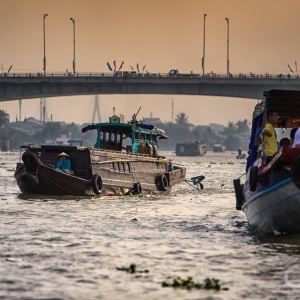The Stream, December 16, 2021: “Climate Whiplash” Hits Australia
YOUR GLOBAL RUNDOWN
- Marine trash and noise pollution are emerging threats to Arctic ecosystems.
- A coalition of Gulf states express support for Egypt in the ongoing Nile River dam dispute with Ethiopia.
- Melting glaciers in the north Pacific could create temporary habitats for regional salmon.
- Great Lakes lawmakers seek funding for a project to stop the spread of the invasive carp.
In Australia, many of the same areas that endured brutal bushfires in 2019 and 2020 are now drowning in record-setting rainfall.
“It seems to take for bloody ever to go away..All it leaves behind is this stink, and it’s just going to get worse.” —Christina Southwell, resident of Wee Waa, New South Wales. Australia smoldered during the epic “Black Summer” bush fires of 2019 and 2020. This year, many of those same areas saw the wettest, coldest November in more than a century. Record-setting rainfall has turned the floodplain into a network of islands, forcing hundreds to evacuate and leaving many more awaiting rescues by boat or helicopter. The island nation has always been at the mercy of climate patterns such as La Niña in the oceans that surround it. But climate change and land use decisions have intensified these trends, plunging the country into one natural disaster after another.
- Why it matters: Across the world, the cycle of disaster is accelerating. A supercharged climate is churning up more powerful hurricanes, more punishing droughts, more oppressive heat waves — altogether more environmental and water-related risk. In many places, Circle of Blue reported earlier this year, these constant, compounding disasters are exhausting emergency response.
IN RECENT WATER NEWS
In Case You Missed It:
This Central Valley Town Has a Carcinogen in its Water. Why Are Solutions So Slow? – The water supply in Fuller Acres, California has been contaminated with a byproduct of agricultural soil fumigants for decades. Residents say officials aren’t doing enough to warn people. This article was originally published by California Health Report as part of the Tapped Out series documenting power and water justice in the rural American West.
High Costs, Few Customers: Benton Harbor Water Woes Loom for Michigan Cities — Shrinking populations and wealth have left many local governments unable to collect enough ratepayer revenue to cover long-term water system costs. This article was originally published by Bridge Michigan as part of the Great Lakes News Collaborative.
Trash, Noise Pollution Threatening Arctic Ecosystems
The annual “Arctic Report Card,” released by the U.S. National Oceanic and Atmospheric Administration, highlighted new threats facing the Arctic: marine trash and noise pollution. Sea ice which once blanketed the region is rapidly melting, opening new routes for global shipping. As a result, garbage has begun to accumulate along the busiest shipping routes, scientists found, and the rumble of passing ships is disrupting marine animals who rely on sound to communicate and navigate. Traffic from fishing, cargo, and military ships has increased by 58% between 2016 and 2019. Experts expect this trend to continue as the region warms. This year also saw the continued “greening” of the Arctic tundra, as temperatures become more hospitable to plants, and the first-ever recorded rainfall in Greenland’s highest elevation.
TODAY’S TOP WATER STORIES, TOLD IN NUMBERS
100 MILLION
On Sunday, a coalition of Gulf states expressed support for Egypt in its ongoing dispute with Ethiopia over the Grand Ethiopian Renaissance Dam (GERD) on the Nile River. The Ethiopian government is building the GERD, a hydropower project, to provide reliable electricity to its population of over 100 million. Downstream states, including Egypt and Sudan, warn that filling the dam will lower the river’s water levels in their territories. Attempts to negotiate a binding agreement have so far been unsuccessful.
6,000 KILOMETERS
A new study found that the retreat of glaciers could create more than 6,000 kilometers of new habitat for Pacific salmon, whose habitats are disappearing due to the effects of global climate change elsewhere. Some regions could see new salmon habitats as soon as 2050. The study’s authors emphasize that the ecological benefits of such a trend would only be temporary; if atmospheric warming continues, these habitats, too, would eventually disappear.
- In Context:
ON THE RADAR
Midwest lawmakers and governors have requested funding from Congress to prevent the spread of invasive carp into the Great Lakes. Officials hope to speed the fortification of the “choke point” lock and dam project on the Des Plaines River in Illinois, designed to hamper carp migration while still allowing barges to pass through. The bulk of the carp population is currently about 50 miles from Lake Michigan, though individual fish have been found closer.
Laura Gersony covers water policy, infrastructure, and energy for Circle of Blue. She also writes FRESH, Circle of Blue’s biweekly digest of Great Lakes policy news, and HotSpots H2O, a monthly column about the regions and populations most at-risk for water-related hazards and conflict. She is an Environmental Studies and Political Science major at the University of Chicago and an avid Lake Michigan swimmer.






Leave a Reply
Want to join the discussion?Feel free to contribute!